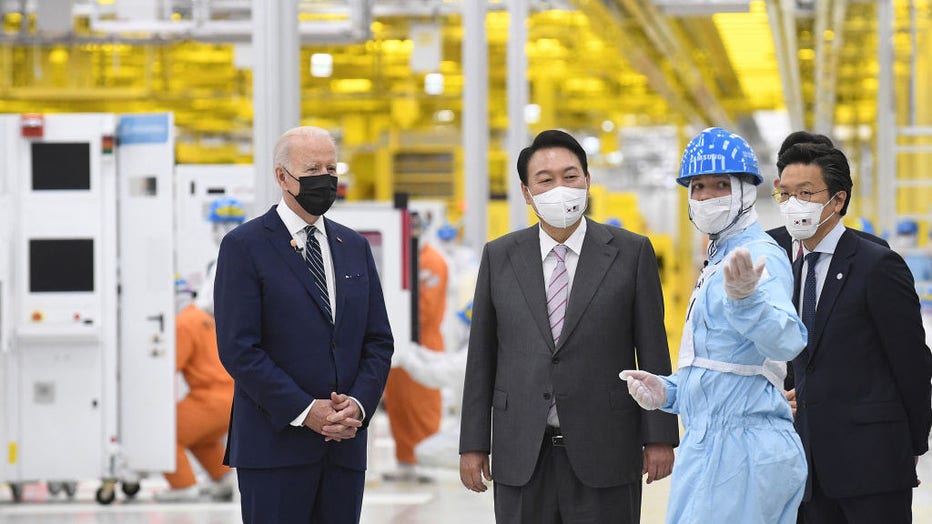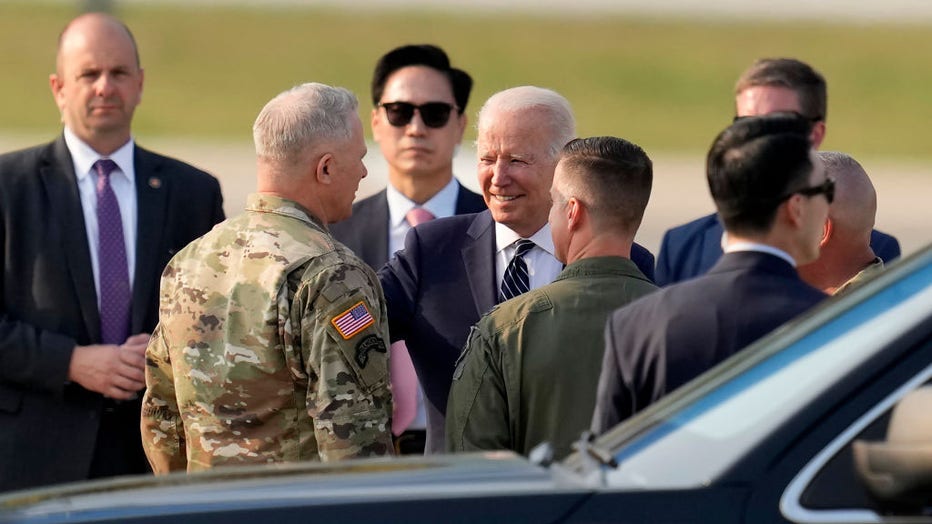Biden: South Korean computer chip plant a model for deeper ties to Asia
PYEONGTAEK, South Korea - President Joe Biden opened a trip to Asia on Friday by touring a South Korean computer chip factory that will be the model for another plant in Texas, offering it as a way to deepen ties with the Indo-Pacific and fuel technological innovation and foster vibrant democracies.
"So much of the future of the world is going to be written here, in the Indo-Pacific, over the next several decades," Biden said. "This is the moment, in my view, to invest in one another to deepen our business ties, to bring our people even closer together."
Biden's message was pitched toward the promise of a better tomorrow, yet was also aimed at U.S. voters amid political challenges at home, such as inflation driven higher by the chip shortage, as he tries to show that his administration is delivering on economic growth.
The Democrat's first visit to Asia as president came as polling released Friday by The Associated Press-NORC Center for Public Affairs Research found Biden's U.S. approval rating at 39%, the lowest point of his presidency. The survey also found deepening pessimism about the economy and the state of the United States — especially among Democrats.
About 2 in 10 U.S. adults say the country is headed in the right direction or described the economy good, down from about 3 in 10 in April. Among Democrats, just 33% say the country is on the right track, down from 49% last month.
Samsung, the chip plant's owner, last November announced plans to open a $17 billion semiconductor factory in Texas. A semiconductor shortage last year hurt the availability of autos, kitchen appliances and other goods, causing higher inflation worldwide and crippling Biden's public approval among U.S. voters. The president noted that the Texas plant would add 3,000 high-tech jobs and the construction would include union labor.
"These little chips," Biden said in remarks after he toured the plant, "are the key to propelling us into the next era of humanity’s technological development."

PYEONGTAEK, SOUTH KOREA - MAY 20: U.S. President Joe Biden and South Korean President Yoon Suk-yeol visit at Samsung Electronics Pyeongtaek campus on May 20, 2022, in Pyeongtaek, South Korea. (Photo by Kim Min-Hee - Pool/Getty Images)
Biden was seeking to frame business collaboration and foreign investment in the U.S. as part of his broader economic goals, and also good for him domestically. He was to appear Sunday in Seoul, South Korea, with the chairman of Hyundai Motor Group on Hyundai’s decision to invest in a new electric vehicle and battery manufacturing facility in Savannah, Georgia.
Throughout the five-day visit to South Korea and Japan, Biden will grapple with a multitude of foreign policy issues as he tries to explain their relevance to the American public. In his remarks Friday, Biden did not mention China, which has emerged as a prime competitor with the U.S., yet he stressed the value of alliances that currently exclude that country.
Greeting Biden at the plant was South Korea's new president, Yoon Suk Yeol, and Samsung Electronics Vice Chairman Lee Jae-yong. Yoon is a political newcomer who became president, his first elected office, just this month. He campaigned on taking a tougher stance against North Korea and strengthening the 70-year alliance with the U.S.
Before Biden spoke, Yoon said in remarks that he hoped the U.S.-South Korea partnership evolves into an "economic and security alliance based on cooperation in advanced technology and supply chains."

PYEONGTAEK, SOUTH KOREA - MAY 20: U.S. President Joe Biden arrives at Osan Air Base on May 20, 2022, in Pyeongtaek, South Korea. (Photo by Lee Jin-Man - Pool/Getty Images)
The chip plant showed the unique nature of manufacturing as visitors were required to don white laboratory coats and blue booties to help keep the facility clean. Biden and Yoon, who did not wear protective clothing, saw a demonstration of the machinery.
At one point during his tour, Biden received an in-depth explanation of a KLA inspection system on the Samsung plant floor. The California-based company is a major supplier to Samsung’s semiconductor operations. After a worker named Peter explained the ins and outs of the machinery, Biden quipped, "Don’t forget to vote," when he returns home to the United States.
In closing, Biden slipped and thanked "Moon," a reference South Korea's immediate past president, Moon Jae-in, who held the office for several years before Yoon's recent election. Biden quickly corrected the slip-up.
"President Moon, Yoon, thank you for everything you've done so far," Biden said.
Part of the computer chip shortage is the result of strong demand as much of the world emerged from the coronavirus pandemic. But coronavirus outbreaks and other challenges also caused the closure of semiconductor plants. U.S. government officials have estimated that chip production will not be at the levels they would like until early 2023.
RELATED: General Motors removing heated seat option due to chip shortage
Global computer chip sales totaled $151.7 billion during the first three months of this year, a 23% jump from the same period in 2021, according to the Semiconductor Industry Association.
More than 75% of global chip production comes from Asia. That's a possible vulnerability the U.S. hopes to protect against through more domestic production and $52 billion worth of government investment in the sector through a bill being negotiated in Congress.
The risk of Chinese aggression against Taiwan could possibly cut off the flow of high-end computer chips that are needed in the U.S. for military gear as well as consumer goods. Similarly, the hermetic North Korea has been test-firing ballistic missiles amid a coronavirus outbreak, a possible risk to South Korea's manufacturing sector should the brinksmanship escalate.
In terms of chip production, China leads the global pack with a 24% share, followed by Taiwan (21%), South Korea (19%) and Japan (13%). Only 10% of chips are made in the U.S., according to the Semiconductor Industry Association.
Samsung announced the plant in Taylor, Texas in November 2021. It hopes to begin operations in the second half of 2024. The South Korean electronics giant chose the site based on a number of factors, including government incentives and the "readiness and stability" of local infrastructure.
The White House said in a fact sheet issued Friday that semiconductor companies have announced nearly $80 billion in U.S. investments through 2025. That sum includes $20 billion for Intel's plant outside Columbus, Ohio, up to $30 billion by Texas Instruments, a $1 billion expansion by Wolfspeed in North Carolina and investments by Global Foundries and SK Group.
—-
Associated Press writer Darlene Superville in Washington contributed to this report.


